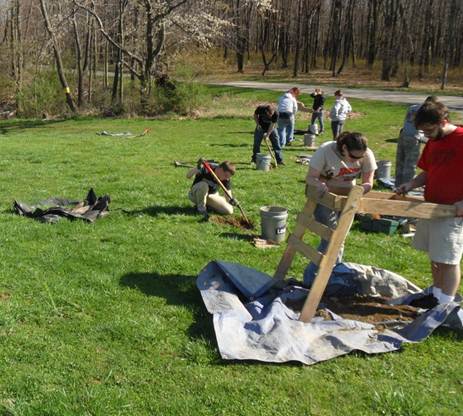Ever since I discovered archaeology in high school I knew that it was going to be my career, even if I have not figured out the specifics of what I wanted to do. By recommendation, I ended up at Indiana University of Pennsylvania (IUP). It was an excellent choice for me, and gave me the chance to learn about the different areas of archaeology that I could choose from. While there are many work-related fields to choose, the two main divisions I saw were cultural resource management (CRM) jobs, and jobs in academia. Either way, I knew that both required at least a Master’s degree and that’s how I found my way to the State University of New York (SUNY) Binghamton.
My current problem is that I am unable to choose which career I want to have –academics or CRM. What makes this even more difficult is the training required for both are so different that they seem like two completely separate fields. Archaeology needed for CRM includes knowing how to excavate shovel test pits, knowing Section 106 and NEPA, writing technical reports, and knowing how to mitigate negative effects to cultural resources. On the other hand, in academia, one needs to know how to do full-scale excavations, write critical academic articles, and teach the next generation of scholars (including grading exams and papers). In CRM, one also needs to know how to interact with engineers, developers, and planners, while those in academics have to learn how to interact with college students (either fresh out of high school or who have been out of school awhile), college administrations, and other departments.
With the amount of work and interactions that each type of professional has to deal with on a daily basis, it is not hard to see why communication between the two has not always been easy. Keri Brondo and Linda Bennett’s (2012) article, “Research Articles: Career Subjectivities in U.S. Anthropology: Gender, Practice, and Resistance”, talks about a need to grow the relationship between universities and non-academic practitioners. With an increase in students getting graduate degrees, I can see the push and pull that most students find themselves experiencing. Do students stay with academia, which most are more prepared for (given the years they have spent in school), or do they go into CRM, which is a vastly different world? The kinds of knowledge that universities excel in and can pass to the next generation is different than what most students coming out of undergrad can expect in CRM or in any other non-academic practitioner’s job market.
It is a dilemma that both professions need to confront: Universities are trying to prepare the next generation for many job markets, but right now, CRM is a specialized field whose trade-work knowledge stays within its own circle. There are universities that are bridging the gap between both worlds. IUP and SUNY Binghamton are two of them. IUP has recently launched an applied archaeology program, and SUNY Binghamton has a good public archaeology facility. For example, IUP’s and SUNY Binghamton’s graduate students work on CRM projects in the surrounding region to gain practical experience. Given the practical applications of having a connection between CRM and universities this may be an increasing trend in the coming years. CRM practitioners are also starting to teach students their trade through internships, such as the opportunity I currently have with PennDOT.
Brondo and Bennett, at the end of their article, are optimistic that if the relationship between CRM and academia is improved, “we may well see a resurgence of the celebration of the value of anthropology [or to its subfield, archaeology] to the public, once held in high esteem under the era of Margaret Mead.”(Brondo and Bennett 2012:607).
I am nowhere closer to knowing what sort of job I will end up having once I graduate, but I hope that whatever I choose to do it will be one that can help the profession reach out to the public and be able to pass on knowledge and excitement to the next generation of archaeologists.
Michele Troutman
Intern Insights is an article series that provides the interns of BHP with a forum to express their thoughts and ideas on the many aspects of historic preservation.
Comment Policy
PHMC welcomes and encourages topic-related comments on this blog. PHMC reserves the right to remove comments that in PHMC’s discretion do not follow participation guidelines.
Commenters and Comments shall be related to the blog post topic and respectful of others who use this site.
Commenters and Comments shall not: use language that is offensive, inflammatory or provocative (this includes, but is not limited to, using profanity, obscene, or vulgar comments); disparage other commenters or people; condone illegal activity; identify the location of known or suspected archeological sites; post personal information in comments such as addresses, phone numbers, e-mail addresses or other contact details, which may relate to you or other individuals; impersonate or falsely claim to represent a person or an organization; make any commercial endorsement or promotion of any product, service or publication.
If you would like to comment on other topics not related to this blog post but related to PHMC, please fill out the PHMC Contact Us Form.
